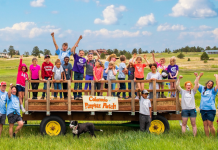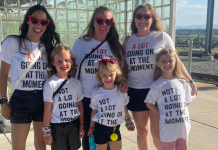This week, my 5th grade son and I have been studying history together. We’re trying to salvage his grade, which he managed to tank during back-to-back Covid quarantines of his class, then his teacher, earlier in the semester. That coupled with trying to reintegrate into team sports was a recipe for disaster. Two years into a global pandemic and “remote independent study” still isn’t a thing for my 10-year-old son. But this is our world and we do the best we can, we have adapted and exist in this routine.
Then, this week, our safe little bubble of concerns started to destabilize almost overnight as I watched the news and realized someone else’s ten-year-old son won’t be going to school today. He won’t be concerned about whether he has to wear a mask or “go remote” for a week. In the blink of an eye, an average 10-year-old boy on the other side of the world is now concerned if he is safe in his home. If they will have food. If he will be able to play with his friends, or if his dad will have to fight.
I feel my heart aching for his mother. I look at my son and realize he isn’t just studying history, he is living in it.
Although I could try to shield my kids from these kinds of things, at my son’s age, I know he is going to be hearing about it somewhere—at school, at home or through pop-up ads on his Chromebook. I want to make sure he is getting his primary source of information from us, his parents.
So here are some ways we are broaching the subject of war with our kids:
Be aware of who is in earshot.
At 10 years old, I learned the hard way that my son is always listening. At this point, he intentionally tries to eavesdrop and I have to be vigilant when having adult conversations around the house.
Be age-appropriate.
My 3-, 6-, and 7-year-olds also have big ears and like to interject in conversations, but for the most part, their sphere of concern is pretty limited to the day-to-day things that impact them. If you talk to them about war, be broad in your explanation, maybe compare it to a bully or another analogy they can understand. Make sure to separate them from older children using broad, vague statements like, “Some people in another county disagree about things and so they are fighting.” This can deliver the message but in a more appropriate way than using words that can scare them, like “war, conflict, or bombs” etc.
Restrict media coverage for younger children and watch alongside older kids and teens.
Being available to answer questions if your teens and tweens need to better understand what they are seeing on tv is key. Whether you are in the checkout line at the grocery store or they have their own devices, they are likely going to be exposed to the news and you’ll want to be there to help them understand.
Point out the helpers.
Sometimes, this is hard when the news is covering conflict. But try to highlight good news whenever you can find it. In the case of war, look for opportunities to point out good things like other countries sending help and aid or medical workers bravely taking care of people etc.
Monitor for emotion.
This applies to both you and your children. If you feel yourself reacting, make sure to take a moment to regroup. You don’t want your kids to see you panic, they need to trust that you are right when you say they are safe, and that is hard to demonstrate when you yourself get overwhelmed. Take a step back, turn off the news and show your kids it is going to be okay. The same goes for them. If you get the feeling your kids are getting too much information, pull it back. Turn off the news and go for a walk. Our kids rely on us to give them the information they need to know, but not more than they can handle.
No matter what, err on the side of caution. Hold back when necessary, your child doesn’t need to grow up any faster than they already are and this world is full of big, scary things. Help them know and understand what they need to in order to develop a good sense of the world but don’t expose them unnecessarily to things out of their control.














This is excellent. I am navigating this with my kids. I am a news junky and I sometimes forget that my level of exposure needs to be curtailed, for the sake of my children and myself.
Comments are closed.